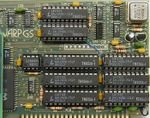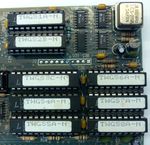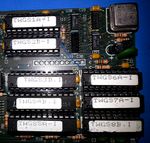TransWarp GS: Difference between revisions
| Line 17: | Line 17: | ||
</gallery> | </gallery> | ||
== GAL Speed Grades == | == GAL Versions And Speed Grades == | ||
GALs 1-2, 6-8 are "GAL16V8" or "GAL16V8A". GALs 3-5 are "GAL20V8" or "GAL20V8A". Lattice Semiconductor found flaws in the GALs security and in early 1989 started to address these issues with the "A" redesign. This is not to be confused with AE's programming revision lettering. | |||
GAL 3 to 5 | GAL 1 and 2 were always 15ns speed grade. These two GAL connect directly to the oscillator and need to be as fast as possible. The 15ns speed grade is only good to Mhz. 7ns speed grade seem to be good to 18+MHz. | ||
GAL 3 to 5 were always 25ns speed grade. | |||
GAL 6 to 8 were usually 25ns speed grade, but were sometimes the faster 15ns speed grade on later dated TransWarp GS boards. | |||
== Why Different GAL Versions == | == Why Different GAL Versions == | ||
Revision as of 17:00, 27 August 2017
What Are GALs
The Generic Array Logic (also known as GAL) device was an innovation of the PAL (Programmable Array Logic) and was invented by Lattice Semiconductor. The GAL was an improvement on the PAL, which itself was an improvement on standard Gate Locig ICs like the 74-series. A GAL can emulate many PALs and 74-series ICs in one device, saving cost, power, and PCB real estate. Its primary benefit, however, was that it was eraseable and re-programmable, making prototyping and design changes easier for engineers. AE used a set of 8 GALs on the TransWarp GS.
AE's GAL Markings
AE sometimes used the part number suffix "N" and other times they used "I". "N" labeled parts have a "-" separating them, whereas the early "I" labeled parts have a "-" for separation and later used ".". It is not clear why the differences in suffixes. However there does not seem to be a difference in the way the GALs are programed. This separation and suffix change was product wide and not limited to the TransWarp GS. The differences could have been from when Don Pote sold AE to a new owner in the early 1990's.
The earliest GALs have a "-I" suffix, and all "labels" are silk screen printed to the GALs. It appears most TransWarp GS boards AE date coded from early 1989 have GAL date codes from 1988 and/or 1989. The earliest production boards would have an "A" revision for GAL3. GAL3 revision "B" is a lot more common for early boards, and usually the GALs all have a 1989 date code on them. However in early 1990 AE changed how they labeled their GALs and the "-N" marking made an appearance on a mylar type label. In mid 1990 there are examples of ".I" suffix appearing, and also AE relabeling old GALs or ever over labeling GALs. See the last pic on the right before for these two examples.
GALs were also user upgradeable and therefore some users were know to have replaced them in order to address early CPU bugs or issues between the different IIgs ROM versions. This could explain some of the mix of different labels found.
-
Early Revision "A" GALs, Mostly 1988 Date Codes
-
More Typical GAL Assortment From Early TWGS
-
Early 1990 Datecode TWGS Board GAL Assortment With "-N" Labels
-
Mid 1990 Datecode TWGS Board GAL Assortment With Mix Of Labels
GAL Versions And Speed Grades
GALs 1-2, 6-8 are "GAL16V8" or "GAL16V8A". GALs 3-5 are "GAL20V8" or "GAL20V8A". Lattice Semiconductor found flaws in the GALs security and in early 1989 started to address these issues with the "A" redesign. This is not to be confused with AE's programming revision lettering.
GAL 1 and 2 were always 15ns speed grade. These two GAL connect directly to the oscillator and need to be as fast as possible. The 15ns speed grade is only good to Mhz. 7ns speed grade seem to be good to 18+MHz.
GAL 3 to 5 were always 25ns speed grade.
GAL 6 to 8 were usually 25ns speed grade, but were sometimes the faster 15ns speed grade on later dated TransWarp GS boards.
Why Different GAL Versions
Mostly we do not know for sure what the different GAL revisions do. The only known GAL is #3 and this is simply by experiment and observation. It is believed this GAL was to deal with the bugs in the original 65815 CPU die.
GAL3, revision "E" addresses the newer 65816 CPU die redesign and is required for correct operation with the new WDC CPUs. Older CPUs will NOT work correctly with revision "E". The revisions "E" GAL does not work correctly with the old CPUs.



